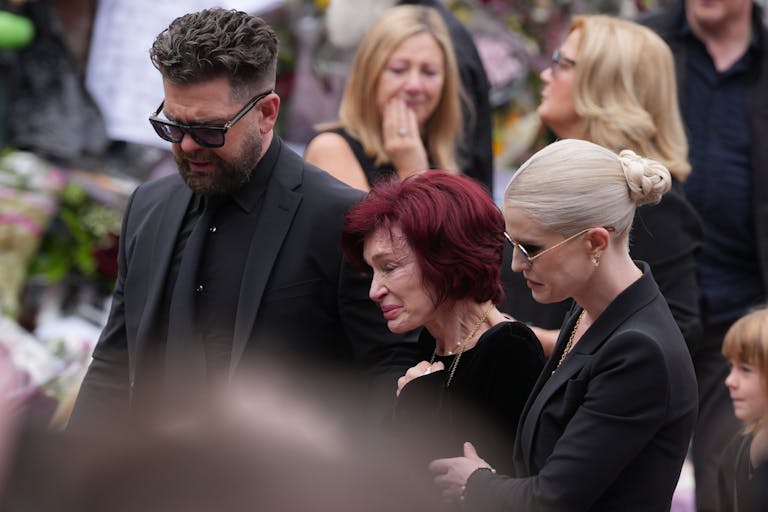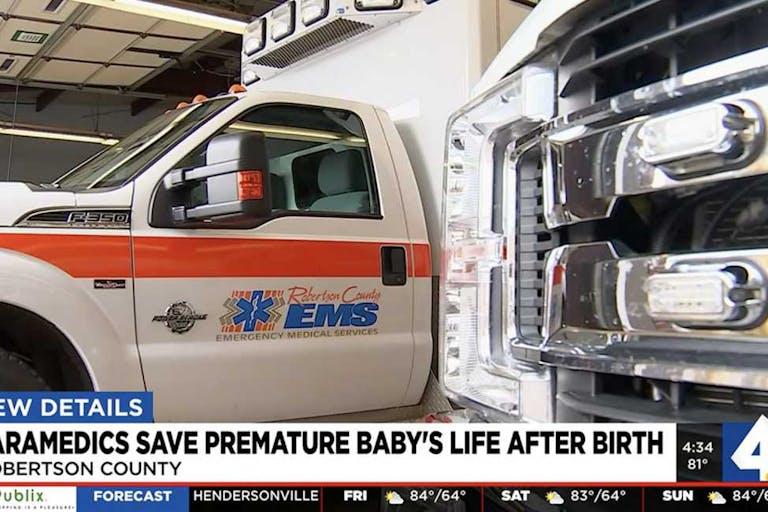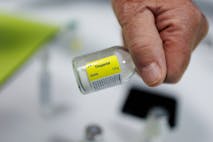
Sharon Osbourne says her kids and grandkids are 'the reason' she's still alive
Cassy Cooke
·
Human Interest·By Bridget Sielicki
Tennessee paramedics save life of preemie who was ‘not breathing and blue’
A team of paramedics from Robertson County, Tennessee, is being credited with saving the life of a baby who was born 10 weeks premature on September 7.
The team responded to a call at around 2 a.m. from a mother who said she was going into labor at home. They arrived at her home just minutes before her baby was born, assisting her with the birth. However, it soon became clear that the baby, who was around 10 weeks premature, was in distress.
“I looked down and saw her newborn infant that was not breathing that was blue as blue can be,” said Alex Shearer, a first responder at the scene.
“I have pretty small hands, so [the baby] was about the size of my hands,” added La’Darrius Huddleston. “No bigger than a palm and a half.”
Robertson County EMS Director Brent Dyer said the baby boy was barely breathing and his heartbeat was almost indistinguishable. Recognizing that resuscitation was needed, the first responders worked carefully to give the newborn oxygen, while also making adjustments due to the child’s extremely small size.
Article continues below
Dear Reader,
In 2026, Live Action is heading straight where the battle is fiercest: college campuses.
We have a bold initiative to establish 100 Live Action campus chapters within the next year, and your partnership will make it a success!
Your support today will help train and equip young leaders, bring Live Action’s educational content into academic environments, host on-campus events and debates, and empower students to challenge the pro-abortion status quo with truth and compassion.
Invest in pro-life grassroots outreach and cultural formation with your DOUBLED year-end gift!
Shearer explained that he used just a slight amount of pressure on the oxygen pump. “I did with like three little fingers, just squeezing it,” he said. After a few tense moments, the team radioed back to dispatch the good news: “Baby is breathing on its own,” Shearer said. “We got a pulse.”
Dyer further explained the necessary steps which were taken very quickly to save the baby’s life.
“The baby boy was a bit hypothermic which wouldn’t be as harmful to most infants or people in general, however, in premature babies, due to the decreased body mass, a low body temperature can develop very quickly,” he said. “This is a significant issue because hypothermia (low body temperature) in neonates can lead to apnea (no breathing). The respiratory arrest leads to low oxygen levels which quickly leads to bradycardia – low heart rate or pulse. Essentially, a domino effect of events was quickly reversed to try and save this baby boy’s life.”
Both the baby and his mother were transported to the local hospital, and both have been reported to be in good condition.
“Once we got to the hospital and seen the baby come back it was pretty spectacular,” said Huddleston. “We make those calls every single day and the times that we get a life back or quite literally save a life is so few and far in between,” said Huddleston. “You know, I’ve done this for seven years and I could probably count on two hands the number of saves I’ve actually got.”

Live Action News is pro-life news and commentary from a pro-life perspective.
Contact editor@liveaction.org for questions, corrections, or if you are seeking permission to reprint any Live Action News content.
Guest Articles: To submit a guest article to Live Action News, email editor@liveaction.org with an attached Word document of 800-1000 words. Please also attach any photos relevant to your submission if applicable. If your submission is accepted for publication, you will be notified within three weeks. Guest articles are not compensated (see our Open License Agreement). Thank you for your interest in Live Action News!

Cassy Cooke
·
Human Interest
Nancy Flanders
·
Politics
Nancy Flanders
·
Human Interest
Angeline Tan
·
Human Interest
Bridget Sielicki
·
Human Interest
Nancy Flanders
·
International
Bridget Sielicki
·
International
Bridget Sielicki
·
Human Rights
Bridget Sielicki
·
International
Bridget Sielicki
·
International
Bridget Sielicki
·